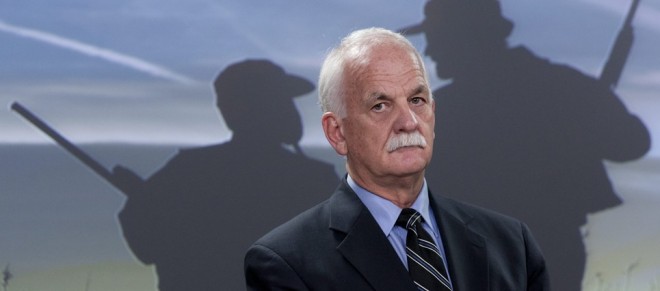The Commons: Vic Toews teaches us a valuable lesson
Where once his critics stood with child pornographers, now he welcomes their advice
Minister of Public Safety Vic Toews talks about the gun registry during a news conference in Ottawa, Wednesday Feb.15, 2012. THE CANADIAN PRESS/Adrian Wyld
Share
 The Scene. Charlie Angus, the honourable member for garish colour combinations, rose this day wearing a purple shirt, silver suit and silver tie. Whatever the attitude thus conveyed, he first struck a sorrowful tone.
The Scene. Charlie Angus, the honourable member for garish colour combinations, rose this day wearing a purple shirt, silver suit and silver tie. Whatever the attitude thus conveyed, he first struck a sorrowful tone.
“Mr. Speaker,” he lamented, “what is clear is Canadians cannot trust the government with protecting their privacy rights.”
To justify this contention, Mr. Angus called his first witness. “Let us try out this quote, ‘What we’re seeing is only the tip of the iceberg. The real threat to Canadian privacy is coming from within, from our own federal government.’ Does anyone know who said that?” the New Democrat asked. “It was Ann Cavoukian, the privacy commissioner of Ontario.”
And with that much established, Mr. Angus rounded on the Public Safety Minister, his sad tone replaced with adamant indignation. “According to the minister, she is on the side of child pornographers,” he charged. “He is wrong. She is on the side of average, law-abiding Canadians who play by the rules. So why is he on the side of intrusion, snooping and treating Canadians like criminals?”
Vic Toews, perhaps tired from the last 48 hours of dancing around and away from that thing he said, seemed unwilling to engage this provocation.
“Mr. Speaker, that member is a member who has never said anything accurate about the bill in the House or outside the House,” he sighed. And on that note he changed the subject. “In fact, the issue is where that members will stand tonight,” he ventured. “He has told his constituents that he will be voting against the long gun registry. I trust that he will in fact carry out his word to his constituents.”
Mr. Angus was apparently happy to debate personal courage. “Mr. Speaker, here is a minister who today hides behind guns. Yesterday he hid behind children,” Mr. Angus shot back. “At 10 a.m. yesterday the name of the bill that he was bringing in was called Lawful Access. By 11 a.m. he was being hammered in the media, so by 11:17 a.m. he changed the name of the bill to Protecting Children from Internet Predators. It is about using child victims as political cover so the minister can treat average Canadians like criminals. Why this abuse of public trust and why this abuse of our child victims?”
Various New Democrats stood to applaud.
“Mr. Speaker, that is rich coming from a party that never stands up for victims,” Mr. Toews replied weakly.
The Public Safety Minister turned to his script, finishing with a concession of sorts. “We will send this legislation directly to committee,” he said, “for a full and wide-ranging examination of the best way to do what is right for our children.”
Standing next, Bob Rae pressed the advantage. “Mr. Speaker, I am sure that the people who come forward with amendments will not be called Adolf Hitler,” he scolded from the far end of the room, “will not be called terrorists and will not be called friends of pedophilia by the minister when they come forward with reasoned amendments.”
Then Ralph Goodale stood to make clear the extent of the retreat. “The Prime Minister implied a few moments ago that he will entertain amendments to Bill C-30,” he lectured. “Do we have his guarantee that amendments will in fact be welcomed in the parliamentary committee?”
Mr. Toews stood and admitted that where once his critics stood with child pornographers—those critics having apparently turned up on his own side—now he welcomed their advice. The government would, he said, “entertain amendments.” The minister managed some criticism of the Liberal corner, but it seemed relatively futile by this point.
Showing no mercy, the NDP’s Francoise Boivin stood across the aisle from Mr. Toews and pronounced shame on the minister and the legislation. Mr. Toews rose to impart a bit of wisdom.
“Mr. Speaker,” he said, “the member, by trying to over-emphasize her point, discredits herself.”
There were chuckles on the opposition side, but here, for sure, is a valuable lesson.
The Stats. Military procurement, nine questions. Online surveillance, seven questions. Pensions, six questions. Government spending, four questions. The environment, three questions. Immigration, firearms and infrastructure, two questions each. Air Canada, transport, aboriginal affairs and government contracts, one question each.
Julian Fantino and Vic Toews, eight answers each. Diane Finley, six answers. Stephen Harper, four answers. Denis Lebel, three answers. Shelly Glover, Peter Kent and Jason Kenney, two answers each. Lisa Raitt, Joe Oliver, John Duncan and Rona Ambrose, one answer each.